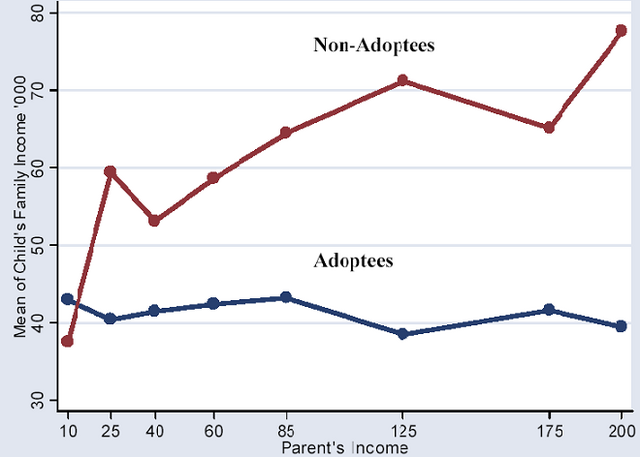Nature vs Nurture
November 30, 2004
Over at Marginal Revolution, (which is a great blog for the libertarian/lassez faire economic school,) there's discussion of a new paper which explores the effect of adoption on one's earnings potential. The results are certainly worthy of discussion:
One could argue, as some do, that this graph is finally "proof" that nature triumphs over nuture - despite growing up in the same exact household, under the exact same conditions, adoptees just weren't affected by that environment to the same extent as their non-adopted siblings.
The unstated implication that many have taken from this chart is that the adopted sample earned less money than their non-adopted siblings. Let's be clear before we continue - this is not at all the case. All this chart shows is that there's no correlation between adoptees' incomes and that of their parents. They might all have been self-made millionaires, all paupers, but most likely, were just all over the map.
Now then, on to the study itself. The biggest flaw I see here is the fealty a biological parent shows towards a biological over an adopted child. By definition, this study compares adoptees to the biological children of their "parents." It's genetic - it's in our nature - to promote our own DNA, our progeny, at the expense of others. No matter how much a parent loves their adopted child, I'd suspect that more often than not it's the biological offspring who are groomed for the family business. Again, this isn't saying that the adopted children were cast aside - rather, they may well have been encouraged to go off to college and find a profession that would make them wildly more successful than their siblings. They could become doctors, lawyers, bankers, whatever. They're just plain not as likely to inherit the family store.
No single study is ever going to resolve the nature vs nurture debate. Primarily, this is because there is no answer. Concepts such as intelligence and earnings potential are affected by both nature and nurture. Are some people naturally "smarter" than others? You bet. Is "intelligence" dependent on whether you were encouraged and challenged as a child? Absolutely. Is one of these factors more influential on a specific person's ultimate intelligence? I'm sure of it. Is either nature or nurture more influential on a population's intelligence as a whole? Nope. Sorry. There are just too many variables to ever resolve this case on a universal level. Books like The Bell Curve which try to suggest an answer to the nature vs nurture question are filled with flawed studies and questionable data. We can just add this paper to the growing list.
Social science, an oxymoron if ever there was one, attempts to use scientific methodology to resolve questions which cannot be fit into a logical, black and white construct. Studies like this only exacerbate the problem - humanity and society are far too complex to be studied mathematically. It's impossible to control for every variable, so any study is, by definition, corrupted. The further we delve into the nature vs nurture debate, the more factors we discover that play a part in things like intelligence or earnings potential, two terms that are ill-defined at best. Ultimately, it's these variables themselves, not nature or nurture, that define our intelligence. Solving the nature vs nurture debate is as futile as it is difficult.
Posted by Jason Pront at November 30, 2004 2:32 AM
